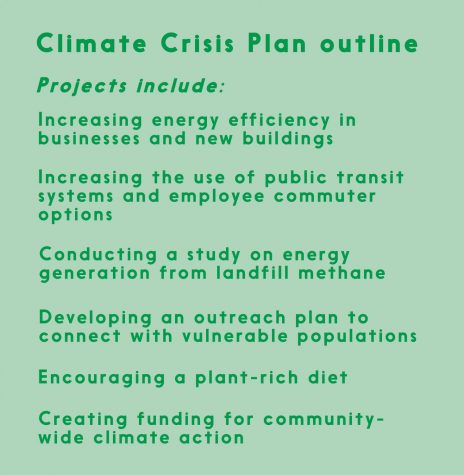Your donation will support the student journalists of West High School. Your contribution will allow us to purchase Scholarship Yearbooks, newsroom equipment and cover our annual website hosting costs.
A climate crisis
March 5, 2020

A single vehicle emits about 4.6 metric tons on average per year, according to the United States Environmental Protection Agency.
The Iowa City City Council voted to declare a climate crisis on Aug. 6. The council has challenged the city to curb the effects of climate change by adopting a strict plan consisting of reducing greenhouse gas emissions by 45% by 2030 and attempting to get to net zero emissions by 2050.
“We want to play our role in reducing greenhouse gas emissions enough to avoid serious, long- term damage to human life or other life on Earth. That’s the big picture,” said Iowa City mayor Jim Throgmorton.
Though the plan may sound simplistic, Throgmorton knows that the issue requires a more complex solution.
“I think a key step is not to simply rely on math, saying, ‘Okay, in order to achieve our goal, we need a 45% reduction,’” Throgmorton said. “Instead, [we need] to ask the diverse public what matters most to them.”
According to Throgmorton, the answer to this question lies in finances. Since the most effective ways to combat the climate crisis involve expensive investments like the installation of solar panels or better heating and cooling systems, the city is trying to find avenues to financially incentivize people in a way that benefits both the environment and their incomes.
“Some people might worry about the affordability of housing, which in part is directly related to the cost of utilities, like getting gas for heating, electricity, better conditions and so on,” Throgmorton said. “People might be very interested in reducing the amount of money they’re spending on utilities.”
One significant step that Iowa City is taking towards achieving their goals is the formation of a new Climate Action Coalition. The group will focus on advising citizens about what steps can be taken to combat climate change, as well as trying to get the public engaged in the plan.
“I think it’s really important not to rivet your attention on how bad things can be, but to instead focus on the opportunities created by the need to avoid those damages,” Throgmorton said. “If we face a climate crisis, we should respond as if it were a crisis.”
I think it’s really important not to rivet your attention on how bad things can be, but to instead focus on the opportunities created by the need to avoid those damages. If we face a climate crisis, we should respond as if it were a crisis.
— Jim Throgmorton, Iowa City Mayor
Another route the city is taking to become more sustainable involves transportation. With the implementation of a bike share in the next year, Iowa City is working towards fulfilling the climate action plan that called for shifting 55% of transportation to sustainable options.
Transportation Director Darian Nagle-Gamm headed this partnership with Gotcha Mobility, a transportation company. The bike share program will provide electric-assisted bikes located at convenient locations throughout downtown area.
While this new addition could incentivize people to choose more sustainable options and provide them with easier access to them, the bike share program alone will not have the capacity to eliminate all emissions due to the inevitable use of cars.
4.6 metric tons is the average amount of CO2 that a single vehicle emits each year as stated by the United States Environmental Protection Agency. At West High alone, 436 students have registered their vehicles for the school year. However, some of the West community opt to trade in their four wheels for two by eliminating the use of a car.
West science teacher Jeffery Conner initially began riding his bike to school because he didn’t own a car, but has continued to bike instead in an effort to become more environmentally-conscious.

“I’ve now been teaching for seven years, and I could get myself a car, but I have chosen not to,” Conner said. “I think that it’s good to have the exercise and it’s good to help the planet.”
Conner rides his bike year-round, from 90 degree heat to snow storms. Even when the weather is too dangerous to bike in, he utilizes public transportation all in an effort to reduce his carbon footprint as much as possible.
“I have a feeling that things are going to get a bit harder in the future as a result of climate change. I want to look back and know that I made choices that didn’t affect things as negatively as what some people did,” Conner said. “I know, though, that regardless of the fact that I bike, I’m still contributing to the climate change problem. The way that all of us live, our lives are not sustainable.”
